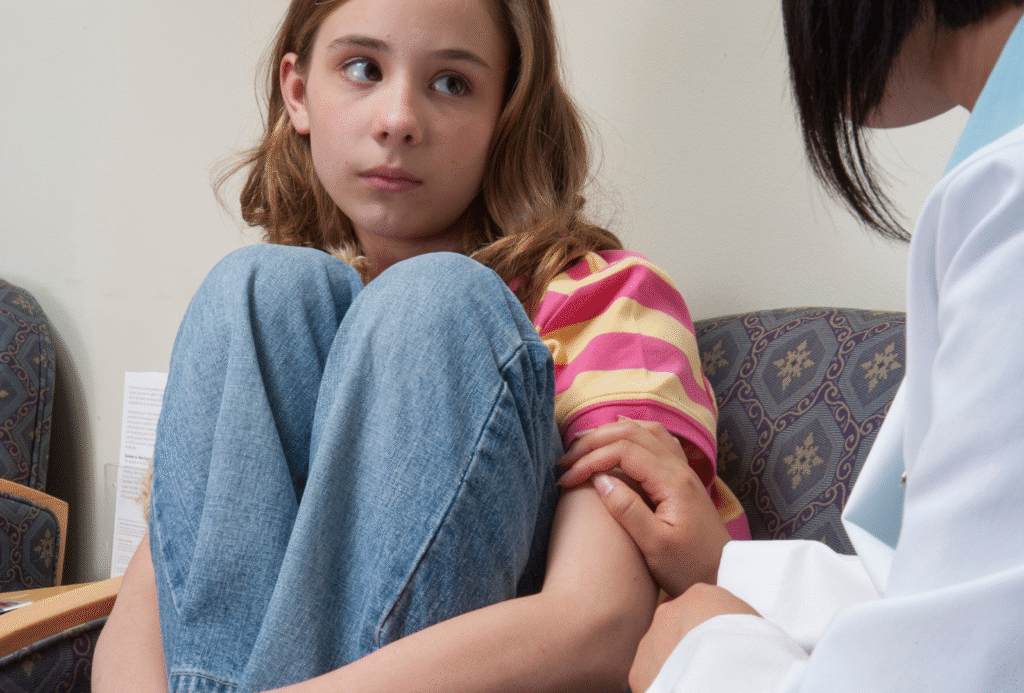Child mental health
Pharmacogenomic Testing in Mental Health Care: Practical Guidance for Pediatric PCPs
With genetic testing becoming more popular and accessible, many primary care providers wonder whether pharmacogenomic testing (analyzing DNA to understand medication response) is worthwhile when making treatment decisions for patients with mental health conditions. REACH faculty member and clinical psychopharmacologist/psychiatric pharmacist Lynn Crismon, Pharm.D., FCCP, FASCP, DABCP, BCPP, says he is regularly asked about this…
Read MoreSocial Media & Pediatric Mental Health
Insights from Dr. Jasmine Reese based on an episode of REACHing Solutions, a new podcast series from The REACH Institute Social media is woven into nearly every part of young people’s lives. Recent data shows that about 93% of U.S. teens (ages 13–17) use at least one social media app. For many kids and teens,…
Read MoreBullying and Pediatric Mental Health: What Primary Care Providers Should Know
“Kids seldom come into your office and say, ‘I want to talk about bullying,’” explains REACH faculty member Ron Marino, DO/MPH. “Often, as clinicians, the only indication we have that a child is being bullied are changes in their behavior or new mental health symptoms. It’s our job to notice these changes and take appropriate…
Read MorePCPs Are on the Front Lines of Suicide Prevention: Tools to Feel More Confident Having the Hard Conversations
“The first time you ask a kid about suicide, it’s scary,” explains Eugene Hershorin, MD, a developmental pediatrician and REACH faculty member. “But navigating that fear and asking the question can save a child’s life.” Research shows that primary care providers have a critical role to play in suicide prevention. Among youth, 80% of those…
Read MoreManaging Mental Health Disorders in Adolescent Cannabis Users
“Mental health disorders and substance use are a very common comorbidity, including among youth cannabis users,” shares child and adolescent psychiatrist Blair Ritchie, MD FRCPC. With 40% of youth reporting prior cannabis use, pediatric primary care providers are increasingly likely to see patients in this population who also have mental health needs. Research on the…
Read MoreCulturally Responsive Parent Empowerment and Children’s Mental Health
“Parents want to feel like they’re part of the solution for their child’s mental health needs. As pediatric primary care providers, we can help make that possible by being thoughtful in how we navigate cultural differences,” explains Noor Jihan Abdul-Haqq, MD, a REACH faculty member and pediatrician with her own practice in Oklahoma City, OK.…
Read MoreMental Health Care for Under- or Uninsured Pediatric Patients
“Evaluating and treating mental health problems in under- or uninsured pediatric patients often presents more challenges, but it is even more rewarding when you are able to provide life-changing mental health care,” explains Natalie Robiou, MD, a pediatric primary care provider at a Federally Qualified Health Center (FQHC) in Philadelphia, PA. The number of pediatric…
Read MoreFrom Screening Tools to Systems Change: Tips for Putting Your REACH Training Into Practice
When providers attend their first Patient-Centered Mental Health in Pediatric Primary Care (PPP) training with REACH, many leave feeling empowered and excited to implement their new knowledge. But having evidence-based tools is only the first step in supporting mental health for children and adolescents. We asked several PPP alumni—and one who is now a faculty…
Read MoreHow Social Media is Impacting Teens
The most important question that we can ask teens isn’t if they use social media, it’s how. Just last May, the Surgeon General’s advisory on social media use in youth exposed some shocking statistics: Among 13 to 17-year-olds, up to 95% use social media, with 35% saying they use social media “almost constantly.”
Read MoreTips for Managing Mental Health Disorders in Children with Autism
“It used to be that when a diagnosis of autism was given, no other mental health comorbidities could be recognized,” explains Ruth E.K. Stein, MD, a REACH faculty member and Professor of Pediatrics at Albert Einstein College of Medicine and the Children’s Hospital at Montefiore. “That changed in 2013 with the release of the DSM-5. For…
Read More






